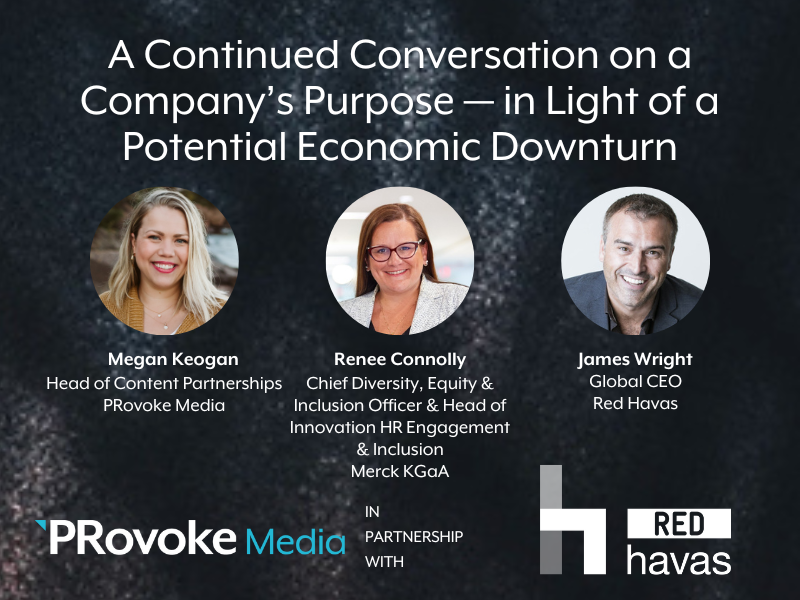PRovoke Media 20 Sep 2022 // 6:16PM GMT

The last quarter of 2022 is on the horizon, and the future remains full of unknowns. For months, there have been rumors that many of the world’s leading economies will fall into a recession within the next 12 months. Employees are turning to their employers for answers as to what the future holds – for the economy, their jobs and greater social issues.
In this episode of the PRovoke Media podcast, James Wright, global CEO of Red Havas, and Renee Connolly, chief diversity, equity & inclusion officer, and head of innovation HR engagement & inclusion at Merck KGaA, discuss a company’s position when it comes to these hot issues and the importance of having a purpose.
“We’re obviously still in a pandemic,” Wright said. “We’re still facing issues around social justice and equity. We’re still facing big issues around climate change. It is now incumbent on those organizations that want to be seen as leaders to get out in front of this and really demonstrate that purpose is more than a word. It is part of the fabric of their organizations.”
More and more data is showing that employees care deeply about a company’s purpose and its alignment to environmental, social and governance (ESG) issues. For example, a study titled “The Power of Purpose: How Organizations are Making Work More Meaningful” by Northwestern University found that when companies had a greater sense of purpose, their employees reported their work was more meaningful.
For the company, there are bottom-line metrics tied to purpose, too. A similar study titled “Beyond Net Promoter Score: Customer Experience Measurement Reimagined” published by Harvard Business Review in March found that when companies had a clearly articulated purpose which was widely understood in the organization, they had better growth as compared with companies which hadn’t developed or leveraged their purpose. More specifically, 52% of purpose-driven companies experienced over 10% growth compared with 42% of non-purpose-driven companies. Purpose-driven companies benefitted from greater global expansion (66% compared with 48%), more product launches (56% compared with 33%) and success in major transformation efforts (52% compared with 16%).
Still, not all companies can be everything to everyone, however. Connolly noted that it’s important to be authentic and make sure the work you’re doing in this space is meaningful.
“There are three categories: you’re either sort of a supporter in the ESG space, a partner kind of middle-of-the-road or you’re progressive,” she said. “And not every company is going to be progressive. You have to be true to what you are. We might not ever be the most progressive company on some topics, but we’re going to do what’s right for our own business, for our customers, for our employees, and make sure that we’re doing it for the communities in which we live and work.”
Topics Include:
0:00 Introductions
3:16: Putting Purpose into Action
7:21: The Intersection of Professional and Personal Purpose
8:07: The Importance of Data Transparency
14:00: If You Can’t Measure it, You Can’t Manage it
18:48: Organizations: Be True to Who You Are
21:42: Anti Best-Practices: Talk About What Didn’t Work Instead
27:41: Purpose Pays Back to the Brand
31:24: Is it the Employer’s Responsibility to Educate Employees and the Community?


































.jpg)











